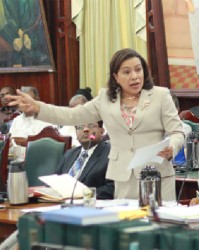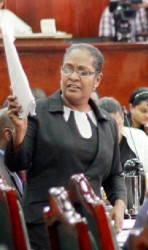APNU MP Deborah Backer yesterday cautioned that in the aftermath of the death of President Hugo Chavez, Venezuela has to be closely watched as it relates to the border controversy with Guyana and trade ties but Foreign Minister Carolyn Rodrigues-Birkett was confident of continuing good relations.
“While we know the claims of Venezuela and Suriname are unfounded we must redouble our diplomatic efforts to resolve them,” Backer said as she opened the fourth day of the 2013 parliamentary budget debate.
She noted that Chavez, who succumbed to cancer last month, was instrumental in keeping the Venezuela-Guyana border controversy on the back burner, noting his recommitting to the United Nations (UN) Good Offices process to resolve the matter. She stated though that his untimely death and recent rumblings from the opposition in Venezuela about the need to determine the longstanding matter are sufficient reasons for the government to redouble its efforts to ensure that Guyana’s territorial sovereignty is defended if challenged.
Rodrigues-Birkett, who delivered the second speech of the day, countered these concerns, saying that based on the historical relationship that has existed between the two countries she is confident that continued positive relations will be maintained. She noted that Guyana has received close to US$2 million from Venezuela which will aid in the completion of a homeless shelter.
Backer in her presentation adverted to Guyana’s Petrocaribe agreement with Venezuela, and the possible implications it can have in relation to the ongoing border controversy. Backer said that “under the agreement Guyana receives approximately 50% of (its) oil from Venezuela which is paid for in part with rice and paddy. It is also worth noting that Venezuela is now one of the country’s biggest creditors.”

With Chavez gone and the possible election of the Venezuelan Opposition Leader, “our Petrocaribe agreement may well be re-evaluated and the Venezuela-Guyana border issue may be moved to the front burner, we don’t know,” she said.
Venezuelan opposition leader Henrique Capriles has stated that were he to win the Venezuelan election on April 14, concessional oil to Cuba and other countries would be cut off. Guyana has not been specifically identified.
As such, Backer urged the government to continue to ensure that Caricom countries are fully mobilised and ready to stand behind Guyana should the need arise.
She pointed out, however, that some amount of difficulty could be encountered in this endeavour due to the fact that several Caricom countries are members of the Venezuelan-led Bolivian Alliance for the Americas (ALBA), which had been championed by Chavez as a countervail to US influence.
She said “several of our Caricom members belong to other integration efforts such as ALBA, of which Venezuela is a major player, many of whom have Petrocaribe agreements with Venezuela which to some extent obligates them to Venezuela.” Backer said that “irrespective of their involvement in other bodies we need to call on them to re-commit so that on the border controversy they stand 100% alongside us.”
Backer also took the opportunity to highlight the fact that there have been numerous difficulties in coordinating policy implementation. She said Caricom is not as united as it ought to be, which is an issue that should be addressed if the full benefits of integration are to be enjoyed.

In relation to Suriname, Backer recalled that during the 2012 budget debate, a call was made to bring an end to the illegal Correntyne crossing, which she said not only presented a threat to the lives of those using the route, but also compromised Guyana’s territorial integrity and facilitated the illegal movement of people and goods.
Rodrigues-Birkett, in her presentation, stated that “we are ready to move with this issue but you would recognise that it has to be done on both sides at the same time for it to work and so we have begun those discussions with Suriname and hopefully we would be able to move forward with those discussions this year and hopefully implement that later in the year.”
Moving to the issue of Guyana’s interaction with international entities, Backer bemoaned what she said was the misuse of international organisations such as the United Nations, specifically the United Nations Children’s Fund.
In January of this year, said Backer, the Guyana delegation, including Advisor on Governance Gail Teixeira and Human Resources Minister Jennifer Webster, appeared before the United Nations Rights of the Child Commis-sion. Quoting a Stabroek News report, she shared the government’s arguments which read: “meanwhile the government told the UN committee that 3000 girls leave school annually because of pregnancy,” but noted that the government also told the UN committee that “the greatest threat to the protection and promotion of children rights and equal access to services and the potential for the reversal of the democratic and socio economic gains is the emergence from the threat of the parliamentary democracy posed by the opposition dictatorship of one in the parliament.” “So the reason that they are having the problem of 3000 girls leaving school because of pregnancy is because of the dictatorship of one in the parliament?” Backer queried sarcastically.
Backer said that the government’s claims about the opposition’s racist sentiments against the Chinese are unfounded, especially since it was the PNC government under the late L.F.S Burnham who initially reached out to the Chinese, now Guyana’s second largest creditor after Brazil, seeking diplomatic ties.
During her address, Rodrigues-Birkett referred to Guyana as an exception in the region in relation to sustained economic growth, pointing to a 4.9% growth rate last year despite stagnation throughout the region. She pointed to a report which stated that except for Guyana, Trinidad and Tobago and Suriname, unemployment rates are likely to remain elevated for some time within the range of 2012 of being 12 and 20%.
Rodrigues-Birkett said that as the government continues to bolster development, emphasis will be placed on the development of good education and good infrastructure which will generate wealth and improve the general livelihood of the Guyanese people
She also pointed to plans to expand the Cheddi Jagan International Airport (CJIA), Timehri as well as the Ogle Airport, as Guyana looks to extend South-South relations. In a bid to defend the controversial Marriott Hotel construction, she said that Guyana currently lacks the facilities to host a major international event, but said that the construction of the Marriott would remedy this. “We have smaller hotels but we still need to have bigger and better facilities,” the Minister said. She noted however, the need to balance development with sustainability and cited the Low Carbon Development Strategy as one of the avenues through which this can be accomplished.








